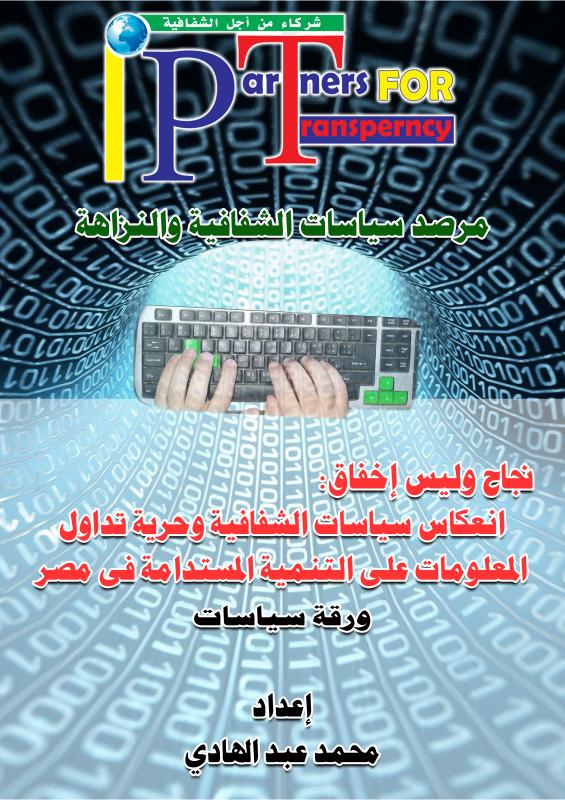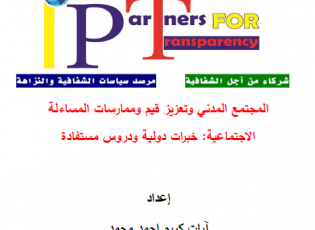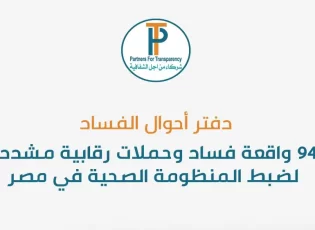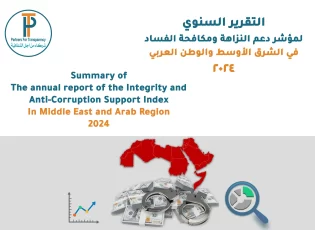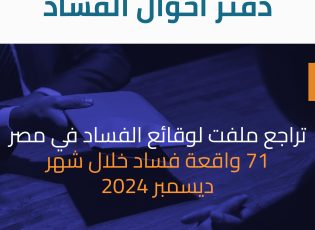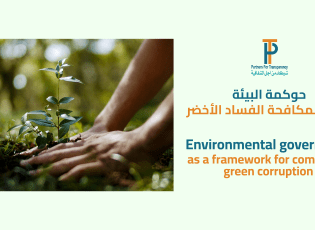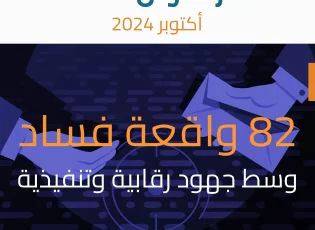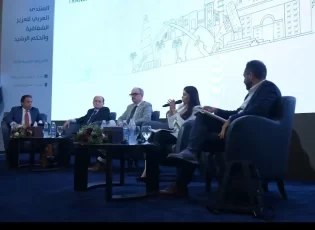Partners for Transparency
Observatory of Transparency and Integrity Policies
Success, not failure:
The reflection of transparency and freedom of information policies on sustainable development in Egypt
Policy Paper
Preparation
Mohammed Abdul Hadi
an introduction
The state has witnessed a new transformation in redefining its role and functions, at the current stage, as a direct result of globalization and neoliberal policies. In the Arab countries, the outbreak of the series of popular uprisings and the "Arab Spring" revolutions in the Arab region, which raised slogans calling for freedom and social justice, had the greatest impact on the growing interest in redefining the role of the state. The experiences of the Arab revolutions demonstrated the negative impact of the state’s withdrawal from the economic sphere in favor of the new capitalist classes.
In the context of this interest in redefining the role and functions of the state, the call for mutual empowerment between the state and society to achieve the desired development policies or sustainable development goals includes activating the transformation towards governance and adopting its applications, and establishing a cooperative relationship between the state and society, based on: There is a relationship of interaction and mutual influence between the state and society, and that is the main determinant in that process, so that: The state’s ability to achieve transformation increases as long as society is in its aid, and the state depends on its participation[1].
Therefore, this paper issued by the Integrity and Transparency Policy Observatory at Partners for Transparency comes to deal with transparency frameworks and freedom of information circulation as one of the applications of governance and its relationship to sustainable development in that it contributes to the success and failure of the developmental policies and economic reform programs of the state, in light of the requirements of building a developed country. In Egypt and the 2030 vision, and related to this is the goal of building the integrated personality of the human citizen and empowering him by strengthening the capacities of the public and local administrations, and working to meet the needs of freedom from fear and want and launching the spirit of initiative for every Egyptian and every Egyptian.
Thus, this study begins through the current institutional and development challenges that shape the future of Egypt in its Arab, African and international surroundings, and is a specific path for development in Egypt in light of the vision of the most important characteristic of it that it is comprehensive, as what is applied to the part extends to include the whole, so the sum of individuals and institutions constitutes Society and the state, and can be presented as follows:
- Understanding that local development is what ensures growth and equitable distribution of resources, expansion of human options to live in a decent life, the participation of local communities to enhance opportunities for sustainable development, and the expansion of decentralization, taking into account the wide diversity of goals for members of local communities, and this achieves societal advancement and education Values of belonging, equality and a sense of societal responsibility that maintain community security and stability, and empower citizens at the same time.
- Understanding the clear and effective role of information in its various branches, tools and technologies in the process of public policy-making and rational decision-making in the political system and in managing the affairs of the state and society, thus creating an opportunity for wide-ranging reforms in all other development paths in the country.
- Emphasizing that progress is a comprehensive concept aimed at achieving an interconnected system of goals that do not accept selectivity or fragmentation, and this requires a national effort for development partners. The progress that we should aspire to includes goals: achieving economic efficiency, achieving sustainable technological development, producing modern technology, and upgrading With the quality of human education, health and life, achieving security for human beings, and raising international status.
In this sense, the objectives of the analysis of transparency policies and the right to access information in the development and economic aspects for the purpose of institutional and structural reform are consistent with:
- United Nations Sustainable Development Goals.
- The basic constitutional foundations of society in Egypt (the chapter on the basic foundations), and the state’s tendency towards decentralization in Articles 176, 177, and 218 of the constitution.
- Egypt Vision 2030.
- The Egyptian Government Program 18/2019 - 21/2022.
- Project to enhance transparency and integrity in the public service (2009-2030).
In this light, this research paper deals with: The relationship between Egypt's vision (2030) for sustainable development and transparency in the free flow of information in relation to development fields, discussing requirements for access to transparency, freedom of information circulation and the necessities of structural reform in order to enhance transparency and freedom of information circulation; Through international trends and analysis of the constitutional framework of the aspects and dimensions that prepare for the realization of economic, social and cultural development in their connection with the environment, and the vision of 2030 in Egypt in line with the need to promote the transformation towards a developmental state, leading to presenting a vision about the future of governance, transparency and freedom of information circulation in light of need To more applications of open government as it represents the right to obtain information in the areas of development management in the sense that it represents the administrative environment in support of the activation of these principles and a guarantee for non-failure of development programs and policies at the national and local levels. Without them, talk about sustainable development is not complete, and in a way that contributes to enhancing transparency and integrity In public service and achieving Egypt's vision (2030), and then reviewing the importance and images of local participation in support of the localization of the sustainable development goals, and the role of civil society in that.
First: The relationship between Egypt's vision (2030) for sustainable development and the right to information
Sustainable development is defined among its various definitions as that process in which the various parties or development partners (public sector, private sector, civil society) participate in order to achieve the economic, social and cultural components of society in its connection with the environment that results in sustainable development, and it is thus a process whose goal is In improving the quality of life for citizens, reducing poverty and economic, social and cultural marginalization within the framework of a vision for the realization of economic, social and cultural rights in its constitutional and developmental meaning, taking into account the essence of sustainability, which is the orientation towards the future, preserving the environment and taking the fate of future generations into consideration in any plans, programs or projects for development. That is, without harming the environment and neglecting the requirements of future generations[2].
Egypt's strategy (2030) is divided into (3) main dimensions that include the economic dimension, the social dimension and the environmental dimension, and includes (12) main axes, which include education, innovation, knowledge and scientific research, health, social justice, transparency and efficiency of government institutions, and economic development. Urban development, energy, culture, environment, domestic politics, national security and foreign policy[3].
The economic, social and environmental dimensions of Vision 2030 can be illustrated in the following table[4]:
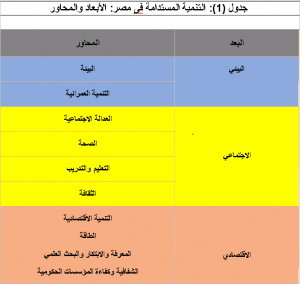
The economic dimension in the fourth axis included “transparency and efficiency of government institutions” and the vision of sustainable development in this regard stated that by the year 2030 the administrative apparatus will become an efficient and effective device that improves the management of state resources and is transparent, fair, flexible, accountable and aware of the satisfaction of its citizens and interacts with them.[5].
As for the indicators for measuring the performance of transparency and the efficiency of government institutions until 2030, the target results included: Government efficiency, And theResponsive government, And theEnforcement of regulatory rules, And theAnti-Corruption, And theTransparency in policy making. While the programs concerned with transparency and efficiency of government institutions until 2030, they are represented in the following[6]:
- Developing the government sector management system.
- Development of the planning and follow-up system.
- Improvement and development of communication mechanisms between the government and the citizen.
- Developing the human resource management system.
- Modernizing the state’s legislative structure.
- Developing the basic infrastructure of the state’s administrative apparatus.
- Modernizing the information infrastructure of the state's administrative apparatus.
- Development of the human element in the state's administrative apparatus.
- Developing government services provided to citizens.
- Combating corruption in state agencies.
Second: The components of institutional reform in the field of transparency and freedom of information circulation in Egypt
There is a set of ingredients for achieving institutional or structural reform in the field of transparency and freedom of information circulation, which is reflected in the improvement of public administration and the achievement of sustainable development goals. These are the pillars and international trends for the right to information, the constitutional framework for governance and information transparency.
-
International trends and principles of Article (19):
Providing the right to be informed and to obtain information in the field of proposed development policies and their circulation among citizens is of importance in terms of: Making decisions from among several alternatives and options, discussing policies and draft laws, monitoring the performance of public and local administrations, uncovering corruption, facilitating investment and establishing projects. Thus, the right to obtain information directly affects limiting the spread of corruption to ensure the existence of popular oversight at local levels. On the performance of the executive bodies and local councils themselves, and help build trust between the citizen and the government, and finally the culture and mechanisms of freedom of information circulation in public facilities and community institutions are devoted[7].
Most of the anti-corruption and environmental protection agreements contain provisions that require their signatories to adopt laws on citizens' right to information, whether the state takes necessary measures to combat corruption or for sustainable development.[8]. Legislative has become a constitutional right in many countries of the world, and may also be included in laws, especially those concerned with the right of the press and citizens to access information (FOIA).[9]Freedom of Information Act
However, this right faces several limitations and limitations that are acceptable within the framework of regulating the use of the right, and the most prominent of these restrictions are the principles of Chawani.[10].
Article 19 (Public Right to Know) has worked on principles in legislation related to freedom of access and the right to circulate information. These principles represent the minimum that must be met in the laws on freedom of information in any country, and they can be guided as best practices in the event of drafting an Egyptian law about The right to circulate or obtain information, these principles are[11]:
- Inferred freedom of information legislation with the principle of maximum disclosure.
- Anticipate government agencies by publishing basic information.
- Effectively promoting open government.
- The exceptions to the right to information circulation are based on a clear and precise manner, in terms of scope and testing of the extent of its harm to the public interest.
- The speed and impartiality of dealing with requests for information, and the availability of an independent review of any refusal to make information available.
- The exorbitant cost does not prevent individuals from submitting information requests.
- Meetings of government bodies are open to citizens and are not limited to documents but also to discussions and decision-making processes.
- Amending or repealing laws that are inconsistent with the principle of maximum disclosure.
- Protection of those who disclose information related to an act of assault or violation of human rights.
This is related to the extent of the transparency of the state's general budget, as the issue of access to information and budget transparency in Egypt is still deficient, despite Egypt's obligations to provide and make available information and actively involve citizens by enhancing transparency and access to knowledge, among these obligations are the United Nations Convention to Combat The corruption that Egypt has signed and is considered one of the first countries, and it was ratified by the President of the Republic and Parliament in 2004 and its implementation began on December 14, 2005, which stipulates in Article 13 / A and B to enhance transparency in decision-making processes and encourage People's contribution to it ”and“ ensuring that people have effective access to information ”[12]The introduction of transparency encourages freedom of information circulation, combating corruption and the ability to monitor with accountability, citizen participation and political openness, but in reality this did not contribute to creating an environment of transparency in Egypt.[13].
-
Constitutional framework for governance, transparency and freedom of information circulation:
Constitutional economic, social and cultural rights are related to achieving equal opportunities in basic needs and supporting them as a development field and an indicator of political trust between the citizen and the government. It is only through them that citizens realize the state’s orientation that there is bias towards them and the system works in their favor or not, and many literature collects that one of the most important factors in promoting social justice is the sustainable development in its economic, social and cultural dimensions in its connection with the environment, whose objectives are to meet the needs of citizens and take policies Generally speaking, it addresses development failures, and takes into account all categories of human rights, in a way that allows the enjoyment of these rights[14].
The Egyptian constitution promulgated in the year (2014) stated that the state guarantees, is committed, or works to achieve economic, social and cultural development as it is the basic constituents of society, and the executive authority and its branches in the constitution bear the burden of implementing these constituents for citizens. The Egyptian constitution issued in 2014 stipulated in Chapter Two of it, entitled “The basic constituents of society,” through three chapters, namely “social foundations,” “economic foundations,” and “cultural foundations,” and was mentioned through articles from Article (7) to Article (50). On the social, economic and cultural rights package.
However, their enforcement does not occur without taking the necessary measures and providing them for the realization of economic, social and cultural rights by mobilizing the efforts of the community, supporting measures to achieve social justice, promoting regional participation and equality, activating integrity and transparency and fighting corruption, and this in practice leads to best practices in promoting the enjoyment of all citizens without Distinguish these rights, taking into account the capabilities and capabilities of the states[15].
This is what the Constitution has dealt with in Articles (27), (68), (78), (177), (218) and (236) that relate to this category of rights and act as determinants for it, and lead to its enforcement or create the administrative and economic environment for its realization. Its content can be reviewed as follows[16]:
- Article (27) in the chapter on the economic constituents of the Egyptian constitution referred to governance and its link to sustainable development and social justice, provided that the economic system’s applications are bound to achieve the goals of economic, social and cultural development. This is an important requirement for achieving and implementing governance in Egypt.
- Article (68) on information transparency relates to economic, social and cultural aspects as well as its connection to public rights and freedoms, and it stipulates that information, data, statistics, and official documents belong to citizens, and disclosure and obtaining them is a right guaranteed by the state to every citizen, and the state is committed to providing and making them available to citizens in a transparent manner, in accordance with what is organized The law includes the rules and controls for obtaining, confidentiality and preservation.
- As for Article 78, it made dignity and social justice a condition for implementing the right to housing by ensuring that the state guarantees citizens the right to adequate, safe and healthy housing, in a manner that preserves human dignity and achieves social justice.
- As stated in Article (177); The state must guarantee the provision of the scientific, logistical, administrative and financial development and assistance needed by local units and communities, while ensuring the fair distribution of facilities, services, and resources, and working towards bringing together development levels and achieving social justice among these units, in accordance with what is organized by the Local Administration Law.
- As for Article (218) within the “Independent Bodies and Regulatory Bodies” of Chapter Eleven, it stipulates the state’s commitment to combating corruption and promoting the values of integrity and transparency, within the framework of coordinating the relevant regulatory bodies and agencies among themselves, while developing and following up the implementation of the national strategy to combat corruption in partnership with others. Of the concerned bodies and agencies.
- Article (236), in the chapter on general and transitional provisions, obliges the state to link urban planning and economic development, taking into account the dimensions and diversity of the cultural and environmental components of local communities, through: Laying down and implementing a comprehensive economic and urban development plan for the border and deprived areas in Upper Egypt, Sinai, Matrouh and Nubia, and the priority for the people of these areas to benefit from the proceeds and development projects.
After this review, the following observations can be summarized regarding the constitutional framework for the relationship between sustainable development and the right to information[17]:
- In five articles, the constitution singles out social justice, but with different meanings. In Article (8) it mentions the state’s commitment to achieving social justice as an image of social solidarity, and in Article (27) it considered it an objective to achieve economic prosperity, while in Article (38) it is considered among the objectives of the tax policy And general outcomes, while in Article 78 ensuring adequate housing conditions became a basis for human dignity and a requirement for social justice, while in Article 177 social justice was associated with development in light of the support and resources the state guarantees to local units, and this unclear vision is negatively reflected on Formulating programs and policies for social justice in Egypt.
- The sectors of education, health and scientific research have acquired constitutional entitlements with financial allocations not less than specific percentages. However, the problem is not only in the views that may arise that reserve this relative allocation, but also that the fulfillment of constitutional rights or the effective investigation of constitutional benefits related to the increase in spending This requires an amendment in the system of managing and distributing public spending, which can only be achieved with the existence of a new system for preparing, monitoring, implementing and monitoring the state's general budget.
- The economic, social and cultural rights in their connection with the standards of citizens' lives must be accompanied by improving public services, combating corruption and upholding integrity, transparency and accountability. Article (218) defines the strategy for the oversight role in this, but there is a slowdown towards activating this purpose.
It is clear from the foregoing that the Egyptian constitution has included clear and explicit texts related to economic, social and cultural rights, and the truth when looking at reality, it can be said that there is a gap between legislation and practice, as the Egyptian case is a clear example of the inability of a constitutional text to guarantee the fulfillment of economic, social and cultural rights. In spite of the constitutional texts that define a group of these rights and even spending on some of them as a percentage of the gross national product, their full fulfillment is still absent from the Egyptian reality, for reasons not only related to the availability of the right, but rather the tools for its full realization.[18].
Therefore, the legislative aspect of providing access to information in development policies is considered as the institutional aspect of the right and access to it, and in this context the importance and necessity of institutional reform is increasing in a way that takes into account the economic, social and cultural context, and enhances the orientation towards governance, transparency and freedom of information, along with reform This must be achieved by improving public policies, combating corruption, and upholding integrity and accountability.
Third: The proposed environment determinants support to activate transparency and freedom of information circulation in Egypt
In the context of interest in redefining the role of the state and calling for mutual empowerment between the state and society to achieve development, the activation of governance and information transparency will only come through adopting concepts and more open government applications Open Government, This theme of the research paper sheds light on the definition and most important principles of open government.
Principles of open government
The OECD has defined open government as "adherence to the principle of transparency in government procedures, easy access to government services and information, and the government's ability to respond to new ideas, demands and needs."[19].
The most important principles of open government are:[20]Transparency and provision of sufficient and reliable information and data on the activities and areas of government work and making them available to the public, accountability and accountability of those responsible for their actions, openness and attention to the opinions of citizens and various parties and taking them into consideration when making and implementing public policies.
As for the benefits of open government, they are mutually essential between government and citizens alike, as transparency and openness about access to information ensures; Participation in dialogue and decision-making, increasing accountability, reducing corruption and efficient spending of public resources, establishing trust and improving confidence-gaining procedures between citizens and the government, adhering to and respecting the rule of law, making the government work better and assisting in the effective transmission, organization, availability and management of information, which increases citizens' awareness of policies and decisions To suit the needs of citizens, better access to services, and the government to inform citizens of services as well as distribute information as part of services.
It is worth noting that creating a culture of openness is an essential step towards creating an open and effective government system. Politicians and government officials must be convinced of the value of making information available before they believe that it will help them in better governance, and at the same time citizens must be educated about the right to circulate information and how to use this right and only through that. They will begin to anticipate and claim it.
The correct approach in open government depends on three pillars: firstly, the presence of political will, secondly, training and qualifying administrative cadres to adhere to open government systems, and finally, the participation of sectors of society, including the popular groups, civil society organizations and political parties. The areas of open government are as follows[21]:
- Proactive disclosure, which means anticipating the dissemination of information and thus responding to citizens' needs for information collectively and not individually, which facilitates obtaining information for the citizen, reduces administrative burdens and the ability to meet requests for information, and helps the public and local administration to get to know the public more, and facilitate information and communication technology Organizing and disseminating the largest amount of government data, and open information initiatives allow the presentation of information in ways that are useful to the public at the local level, and it is useful in addition to these digital technologies, that information is disseminated through more traditional methods such as billboards, flyers, brochures, local radio and television, as well as internal ones, if any.
- Right to information laws that establish the legal right of citizens to access the information they want. Right to Information Laws: This establishes the constitutional / legal right for the citizen to access the information they want.
- Proactive transparency so that governments publish as much information as possible. This requires the government to publish as much information as possible in a form that enhances its availability.
- Open data systems that allow anyone to reuse data in an appropriate way for them.
Therefore, the open data methodology enables re-installation of government data into forms that enhance available and usable information.
It should be noted that the previous standards are not separate and are arranged simultaneously; It works in an integrated manner, and the more well it is implemented, the more the government will move towards openness and transparency. Hence, there are three degrees or stages of openness, as follows[22]:
- The bottom line: An open government recognizes the right to circulate information within the law. There is a legal mechanism that allows citizens to request information, which requires at least the publication of basic categories of information.
- The most advanced towards openness: a developed legal framework that guarantees the right to circulate information and provides a mechanism to ensure the enforcement of this law, and the government must voluntarily publish more data than the basic classifications of information.
- Maximum openness: includes fast request systems and advanced proactive publishing systems that include open information portals and modern information management systems.
Fourth: local participation in the localization of the sustainable development goals
This part of the study is concerned with analyzing the forms of local participation of citizens and activating them as a requirement for policies of transparency and the right to obtain information, and clarifying the role of civil society organizations in this regard.
-
Local Post Pictures:
The importance of increasing citizen participation through local societies is that it entrenches the principles of democracy and citizenship locally, regardless of class, ethnic, tribal, family or gender foundations, especially when representing all groups that were excluded (women, youth, Christians and persons with disabilities). Local participation also leads to the qualification of local cadres, and it seems necessary for the presence of these trained and qualified cadres to work effectively and critically awareness in the affairs of their local communities and contribute to identifying and meeting the societal needs of citizens in local units, and thus their ability to participate, influence and deal with the complexity of policies to strengthen the local administration in a beneficial way. Maximizing the benefits of sustainable development goals and programs. This is what civil society organizations can provide through civic education programs or civil education[23].
It should be noted that the models or images of citizen participation in local work are: the participation of citizens as voters, local representatives, or those responsible for the performance of local services, or in other words, participation in local elections, representation in elected local councils, and the practice of social accountability, meaning that local participation is in its three forms. It is a right and a process at the same time and makes the citizen a local actor, all of which are legislatively organized, and the expansion of the 2014 constitution in the monitoring tools for local councils and the representation of groups that were excluded from nomination and participation is an important step towards local empowerment.[24].
Although the constitution defines the groups that have the right to run in the upcoming local elections, there are obstacles facing citizens' participation in these local councils, which must be taken into account in designing training programs to qualify local cadres, including: considerations of neural connections (tribal and family)[25]And the lack of campaign financing for some political parties[26].
-
Civil society and encouraging local participation:
Given the characteristics of the relationship between civil society and local units, the performance of a number of civil society organizations in the functions of local administration made them gain the confidence of citizens in local communities, and this is an opportunity to enhance the participation of citizens in light of the existence of associations and civil institutions[27]. Modern technological applications have also been reflected in the facilitation of social communication in local work and the increased focus on one local issue instead of the diversity of issues, and this is useful in finding alternatives and addressing the local problem under discussion and interaction, as well as the success of campaigns regarding this current issue.[28].
With regard to how to engage and empower civil society locally to achieve effective citizen participation, it is represented in:[29]The legislative framework that defines the powers and financial resources of the local level, then the participatory practices of local administration, as well as the prevailing civic values. Here comes the role of civic education programs in spreading and consolidating the values of diversity and trust between the citizen and the government.
It is certain that the participation of citizens in local work must be based on supporting the partnership between local councils, associations and civil institutions, and activating the initiatives of individuals, thus enhancing the integration of citizens and expanding their participation in local units[30].
Attention must be paid in this regard to focus in civic education programs on educating citizens, providing basic knowledge, enabling skills to develop citizen participation, and positively changing trends.[31].
Recommendations: Towards enhancing information transparency in sustainable development programs
In order to achieve transparency and access to information within the institutional and structural reform of the public and local administrations, and in a way that enhances the success of economic reform policies and the achievement of sustainable development sought in Egypt, this policy analysis paper is extracted based on some of the most important literature and previous scientific reports concerned with this aspect of information transparency in Its relationship to development and the economy[32]A package of recommendations for the most prominent actors or relevant parties represented in Parliament, the government, regulatory agencies, civil society organizations and citizens, as follows:
- Issuing a law regulating access to information that allows recognition of the right to obtain correct data and information in accordance with international standards, and setting standards for disclosure, taking into account the delicate balance between the freedom of information and matters related to the national security of the state and ensuring the availability of accurate information at its timing in order to expand and increase participation, control and limit Corruption and this conflict of interest on the one hand, and assistance in making rational decisions in public policy on the other hand.
- The necessity of reviewing and refining the existing laws related to the system of transparency and information circulation within a framework of legislative integration, including, for example: Laws No. 35 of 1960 in the matter of census and statistics, Law No. 87 in the matter of public mobilization and its amending laws, and Law No. 121 of 1975 regarding the governorate On the official state documents and Presidential Decree No. 627 of 1981 regarding the establishment of information and documentation centers in the state’s administrative agencies and public bodies.
- While working to establish a legal mechanism to regulate individuals' access to and circulation of information.
- Motivate and reward officials and employees in the government apparatus who perform this right to the fullest.
- More transparency in the state’s public finances, for example the inclusion of the Budget Law No. 53 of 1973 and amendments to a new chapter on budget transparency.
- Providing protection for witnesses and whistleblowers, as reporting corruption crimes is one of the basic human rights guaranteed by international and national conventions.
Conclusion
In this way, the developmental role of the state can be re-adapted and the formulation of sustainable development programs and policies in its various economic, social and environmental dimensions, in order to create and guarantee the opportunity to activate the role of development partners (the state, civil society, companies or profit-making enterprises) when developing and formulating programs for various development sectors, and harnessing their participation to enhance the efforts of the state. Development, and as permitted by the constitution and Vision 2030.
In order for Egypt's vision (2030) to succeed and not fail or falter and achieve the sustainable development goals, the necessity of working to improve public policies and adopting best practices in a way that enhances development and human security, and for the state to direct its public and local administrations to develop the civil service and keep abreast of the current technological developments and digital transformations, with Promote accountability and activate integrity measures, through systems and legislation that enhance the role of the judiciary, parliament, oversight agencies and civil society in combating corruption and protecting the public interest.
In light of this, providing the right to access and obtain information in the field of the proposed development policies and their circulation among citizens directly affects the reduction of the spread of corruption, as it helps to build confidence between the citizen and the government, which raises the efficiency of the regime and the citizen alike, and finally establishes the culture of Mechanisms for freedom of information flow in public facilities and community institutions.
References :
-
Nahed Ezz El-Din, Political Analysis and Proposals for a Transformation Study: From the Intervening State to Mutual Empowerment, Al-Nahda Magazine, Issue 2, (Faculty of Economics and Political Science, Cairo University: April 2004), pp. 99-104.
-
Ola Al-Khawaja, Governance from an Economic Perspective, Economic Development Program for Future Generations in Egypt and the Arab World, The American University in Cairo, College of International Affairs and Public Policy, Senior Leadership Training Programs, from 9 to 13 October 2016.
-
Egypt 2030, p. 2, at the following link:
-
https://goo.gl/7JA8qT
-
The previous reference.
[5] Ibid., P. 12.
[6] Himself, p. 22.
-
Reem Abdel Halim, what amendments must be carried out by the state budget and local administration laws to accommodate the economic and social rights stipulated in the Egyptian constitution in 2014, (policy papers for a conference and training workshop project: Reform of public services in Egypt from November 29 to December 2) 2015, Alternatives Papers Series, Arab Alternatives Forum for Studies, dt), pp. 3-4.
-
Reem Abdel Halim, The Next Parliament and Social Justice Legislation, Alternatives Papers Series, (Cairo: Arab Alternatives Forum for Studies, dt), pp. 3-5.
-
Yahya Shukair, The Historical Development of the Right to Information, The American University in Cairo: College of International Affairs and Public Policy, Senior Leadership Training Programs, Economic Development Program for Future Generations in Egypt and the Arab World from 9 to 13 October 2013, p.18.
-
Yahya Choucair, The Right to Information in Egypt, The American University in Cairo: College of International Affairs and Public Policies, Senior Leadership Training Programs, Economic Development Program for Future Generations in Egypt and the Arab World from 9 to 13 October 2013, p.13.
-
Mohamed El-Agati (et al.), Transparency and Transition in Egypt: Problems and Challenges, in; Transparency: International Standards and the Egyptian Case, (Arab Alternatives Forum and Global Partners and Associates, dt), p. 54.
-
Citizen Budget: Supporting community participation in making the state's general budget, a study conducted in cooperation between the Governance Center of the National Institute of Administration at the Ministry of Administrative Development and the Center for Political and Strategic Studies in Al-Ahram, (dt), pp. 24-25.
-
Governance concepts and policies in Arab and Western literature, a study conducted in cooperation between the Governance Center of the National Institute of Administration at the Ministry of Administrative Development and the Democracy and Human Rights Program at the Faculty of Economics and Political Science at Cairo University, (dt), pp. 29-30.
-
Fouad Al-Salahi, The Arab Spring Revolutions and the Demand for Social Justice, in: Ayman Abdel Moati (review), Social Justice: Concept and Policies after the Arab Revolutions, (Cairo: The Arab Forum for Alternatives for Studies and the Rosa Luxemburg Foundation, dt), pp. 103-105.
-
On development after the Arab dignity revolutions, a political recommendation paper on the work of the Arab Dignity Revolutions Conference, which was held in Cairo on 28 and 29 August 2012, (Cairo: The Arab Alternatives Forum for Studies and the Dutch Hivos Foundation, dt), pp. 8-9.
-
The Egyptian Constitution 2014.
-
Reem Abdel Halim, what amendments must be carried by the state’s general budget laws and local administration to conform to the economic and social rights stipulated in the Egyptian constitution in 2014, (policy papers for a conference and training workshop project: reforming public services in Egypt from November 29 to November 2) December 2015), alternatives papers series, Arab alternatives forum for studies, (Cairo: DT), pp. 3-4.
-
Economic Development for Future Generations in Egypt and the Arab World, Papers of the Training Program for Senior Leadership that was implemented by the School of Public Policy and International Affairs, The American University in Cairo from 9 to 13 October 2016.
-
Andrew Budvat, Rebecca Zasmer, Toward Open and Transparent Governments: International Experience and Best Practices, in: Transparency: International Standards and the Egyptian Case, (Arab Alternatives Forum and Global Partners and Associates, dt), p. 18.
-
Kholoud Khaled, Reading in the New Freedom of Information Draft Law, (Arab Alternatives Forum for Studies, dt), pp. 3-13.
-
Open Government: A New Concept Towards Good Governance, Information Report Series, Issue (56), (Cairo: Information and Decision Support Center, Fifth Year, August 2011), p.7.
-
Look:
OCED (2003), “Open Government: Fostering Dialogue with Civil Society”, https://goo.gl/Wp75zX
[23] Shaima Al-Sharkawy, localities and civil society in Egypt as a way to involve the most vulnerable groups, in: Ayman Abdel Moati (review), local councils and empowering community participation: Arab models, (Cairo: Arab Alternatives Forum for Studies and the Swedish Institute in Alexandria, Beirut workshop in the period of 25 To July 28, 2015, dt), pp. 138-139.
[24] Muhammad Abdel Hadi, Reflection of Governance on Citizen Participation in Localities, Democracy Magazine, Issue 65, (Cairo: January 2017), pp. 121-123.
[25] Wafa Samir Naim, Family Nubia and Political Participation: A Case Study in an Egyptian Village, (Cairo: General Egyptian Book Organization, 2016), pp. 154-155.
[26] Shaima Al-Sharqawy, and Mina Samir, Problems of Participation through Localities, Series of Alternatives Papers, (Cairo: The Arab Forum for Alternatives for Studies, DT), pp. 3-5.
[27] Ayman El-Sayed Abdel-Wahab, Localities and Promoting Popular Participation Towards a New Vision and Mechanisms, Egyptian Status, Issue 61, (Cairo: Al-Ahram Center for Political and Strategic Studies, Summer 2016), pp. 118-120.
[28] Engaging Civil Society in Improving Local Governance, The United Nations Human Settlements Program Board of Directors, Nairobi, 2005, p. 6, at the following link:
http://mirror.unhabitat.org/downloads/docs/1667_13580_K0473700.a.doc
[29] Ibid., Pp. 7-10.
[30] Samir Abdel-Wahab, The Role of Local Administration in Sustainable Local Development in Light of International Experiences, Egyptian Status, Issue 61, (Cairo: Al-Ahram Center for Political and Strategic Studies, Summer 2016), p. 25.
[31] Ayman Al-Sayed Abdel-Wahab, Localities and Promoting Popular Participation, a previously mentioned reference, p. 124.
[32] See this:
Enhancing Efforts of Transparency and Integrity, Transparency and Integrity Committee at the Ministry of State for Administrative Development, Third Report, 3/23/2010, pp. 10-56.
In the following link:
https://goo.gl/zTb9tF
And also; Ahmed Helmy Mujahid (and others), Towards Enhancing Freedom of Information Circulation in Egypt, Development Partners Center, pp. 20-21.
In the following link:
https://goo.gl/AfQ9uu
And also; Freedom of Information and Transparency in Egypt, Center for International Private Enterprise, Series of Policy Papers for Enhancing Transparency and Combating Corruption, pp. 23-27.
In the following link:
http://www.cipe-arabia.org/files/pdf/AR-ACCESS-TO-INFO.pdf.
Short link: https://pfort.org/en/?p=2522

